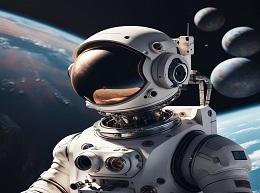AI in Space Exploration: How Artificial Intelligence is Advancing Space Missions

In the vast expanse of the cosmos, the marriage of artificial intelligence (AI) and space exploration has sparked a revolution, redefining the way humanity ventures into the unknown. This article explores the cosmic odyssey of AI in space exploration, showcasing its pivotal role in advancing missions, unraveling mysteries, and pushing the boundaries of scientific discovery.
1. AI's Cosmic Frontier:
Embark on a journey into the synergy of AI and space exploration. Unveil the transformative impact of artificial intelligence on the precision, autonomy, and success of space missions.
2. Autonomous Spacecraft Navigation: AI at the Helm:
Explore how AI enables autonomous navigation for spacecraft. Discuss the role of machine learning algorithms in analyzing vast amounts of data in real-time, allowing spacecraft to navigate and make decisions independently.
Example: Voyager probes using AI-based autonomous navigation to adjust their trajectories based on gravitational interactions, optimizing their paths through the solar system.
3. Machine Learning in Space Telescopes: Unveiling Celestial Wonders:
Delve into the application of machine learning in space telescopes. Discuss how AI algorithms enhance the detection and classification of celestial objects, unlocking new insights into the universe.
Example: The Hubble Space Telescope utilizing machine learning to analyze images, identifying distant galaxies, nebulae, and other astronomical phenomena with greater efficiency.
4. Robotic Exploration and AI: Rovers and Beyond:
Explore the partnership between AI and robotic explorers on planetary surfaces. Discuss how AI enhances the capabilities of rovers, enabling them to navigate challenging terrains, analyze samples, and make autonomous decisions.
Example: The Mars rovers, Curiosity and Perseverance, leveraging AI for terrain analysis, obstacle avoidance, and sample prioritization in their exploration missions.
5. Intelligent Payloads: AI's Scientific Insights:
Discuss the integration of AI in scientific payloads for space missions. Explore how machine learning algorithms analyze data from instruments, providing valuable insights into planetary atmospheres, compositions, and geological features.
Example: Juno spacecraft utilizing AI to analyze data from its scientific instruments, unraveling the mysteries of Jupiter's atmosphere and magnetic field.
6. Deep Learning for Space Data Analysis: Unraveling Cosmic Mysteries:
Delve into the role of deep learning in analyzing vast datasets from space missions. Discuss how neural networks can identify patterns, anomalies, and new phenomena, contributing to groundbreaking discoveries.
Example: The use of deep learning algorithms to analyze data from the Kepler Space Telescope, identifying exoplanets and understanding the diversity of planetary systems.
7. AI in Mission Planning: Orchestrating Cosmic Expeditions:
Explore how AI assists in mission planning. Discuss the optimization of trajectories, resource allocation, and decision-making, ensuring the success and efficiency of complex space missions.
Example: The European Space Agency's AI-powered mission planning for the Rosetta spacecraft, orchestrating the rendezvous with Comet 67P/Churyumov-Gerasimenko.
8. Challenges and Innovations: Navigating the Cosmic AI Landscape:
Examine the challenges and innovations in integrating AI into space exploration. Discuss issues such as communication delays, software reliability, and the continuous evolution of AI technologies.
Example: Overcoming communication delays by implementing onboard AI on spacecraft, enabling real-time decision-making without relying solely on Earth-based commands.
9. The Future of AI in Space: Frontier Beyond the Stars:
Explore the potential future developments in the cosmic partnership of AI and space exploration. Discuss the role of AI in upcoming missions, from interplanetary exploration to studying distant galaxies.
Example: The upcoming James Webb Space Telescope employing advanced AI for autonomous observations, optimizing its usage of observation time and enhancing scientific productivity.
As AI continues to propel space exploration to new heights, "Beyond the Stars: AI's Odyssey in Space Exploration" invites readers to witness the cosmic synergy between artificial intelligence and the exploration of the unknown. Uncover the mysteries of the universe through the lens of AI, a technological odyssey that propels humanity into the future of space exploration.